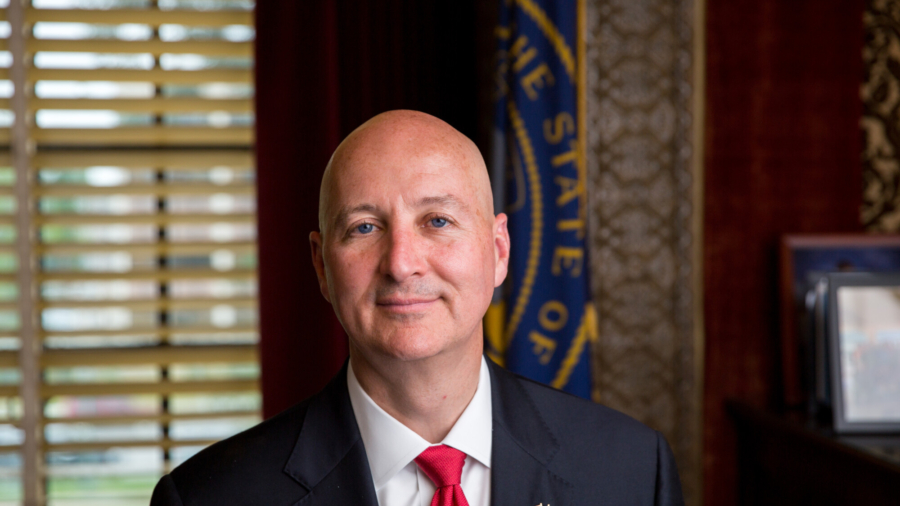Last month, Nebraska reported a new record-low unemployment rate in December, 1.7 percent, the lowest in the nation since data collection began in 1976. In an exclusive interview with NTD, Governor Pete Ricketts explained how Nebraska made it possible.
“It’s because we have a pro-business state here,” Ricketts told “NTD Business” in an interview broadcast on Feb. 11. “We understand that we have to create the rules and regulations that allow businesses to succeed, so they create opportunities for Nebraska families.
“I know that when I ran a business, when we were looking to expand outside of Nebraska, we specifically look at states: if you are not a right-to-work state, we did not consider your state for an expansion,” Ricketts said.
Under right-to-work laws, workers cannot be compelled to become members of a labor union as a requirement of their job. Employers or employees can terminate employment at any time for any reason, as long as no other law is violated.
The Republican governor is also a businessman. With other family members, he’s a part-owner of Major League Baseball’s Chicago Cubs. His father Joe Ricketts was the founder of TD Ameritrade.
“I know from first-hand real-world experiences, businesses look at that, it matters to them. So that’s one of the ways that we attract people here,” Ricketts said.
Another reason is that Nebraska has a workforce with great work ethics, said Ricketts.
“Not only do we have the lowest unemployment rate in the country, but we’ve got the highest workforce participation rate in the country, the highest employment per capita ratio in the country. So Nebraskans want to work,” Ricketts said.
“We’ve got a state where you’ve got that agricultural background, so that strong work ethic has always been a part of our state’s history.”
Some economists also concluded fewer government-imposed restrictions during the pandemic contributed to the low unemployment rate.
Nebraska is one of the seven states that didn’t order lockdowns during the pandemic.
“Without lockdowns or mandates, businesses were able to stay open,” The two-term governor said last month when he delivered his State of the State Address.
In a recent Politico analysis of all 50 states, Nebraska came first in economy of how states fared the pandemic. Nebraska also ranked number one overall in consideration of all four analyzed categories: health, social well-being, economy, and education.
“Nebraska has weathered the pandemic very, very well,” Ricketts said, “In fact, right now, we have more people employed in manufacturing than we did pre-pandemic. And that’s important for us because that’s our second biggest industry after agriculture.”
Ricketts also pointed out that the state revenues are “stronger than ever.”
“In fact, of the fiscal year that ended June 30 of last year, our revenues came in nearly 20 percent above forecasts, and our forecasting board continues to up our forecasts, which is going to allow us to do things like create more tax relief, invest in infrastructure, and so forth. So here in Nebraska, we have been doing very, very well.”
In his State of the State Address, Ricketts estimated that the state would have $1.5 billion in its Cash Reserve Fund by the end of the fiscal year 2023.
The two-term governor also expressed concern with the current record-high inflation.
Based on statistics released on Feb. 10 by the Bureau of Labor Statistics. The consumer price index (CPI) increased by 7.5 percent in January in annual terms. The last time annual inflation was above 7.5 percent was in 1982.
“When you print as much money as the Biden administration has printed, that’s gonna drive inflation. When you have a Fed that has been as easy with money as they have been, you’re going to drive inflation. And both of these groups are responsible for what we’re seeing right now,” Ricketts said.

From a long-term perspective, the Fed has been too slow to act with regard to inflation, said Ricketts.
“This is one of the top things the Fed’s supposed to be working on, they haven’t done it,” Ricketts said. “If they continue to not act, at some point down the road, they will be forced to act and that’s when you get into the situation where you may have those super-high interest rates.”
According to Freddie Mac, the 30-year fixed mortgage rate hit 18.63 percent in October 1981, the highest in modern history.
Ricketts, 57, said he was a young person at that time, and the inflation was “just terrible for families.”
“If they act now they can avoid it. But by delaying, you’re only gonna make it worse down the road,” Ricketts said.
After the latest CPI was released, President Joe Biden responded that his administration “will continue to be all hands on deck” to deal with this issue, adding forecasters “continue to project inflation easing substantially by the end of 2022.”
The Fed hasn’t responded to a request for comment. It’s expected to start raising interest rates at its next meeting in March.
From The Epoch Times


